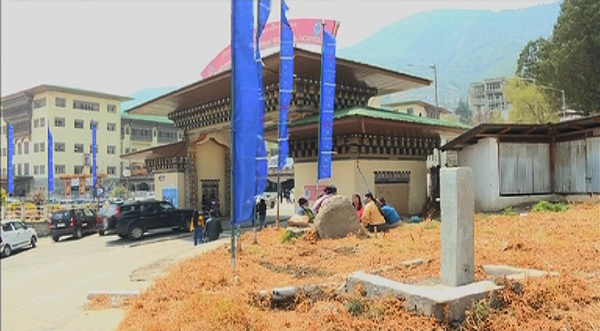 The lockdown came down harshly on street vendors, as it did for many other workers in the country’s informal sector. One such example is the street vendors selling tea and snacks at the sale outlet near the national referral hospital in Thimphu. A year has passed already and the outlet remains closed affecting the livelihood of the street vendors.
The lockdown came down harshly on street vendors, as it did for many other workers in the country’s informal sector. One such example is the street vendors selling tea and snacks at the sale outlet near the national referral hospital in Thimphu. A year has passed already and the outlet remains closed affecting the livelihood of the street vendors.
The pandemic came in like a nightmare for 73-year-old Pabi Darji, one of the street vendors in Thimphu supported by the Bhutan Association of Women Entrepreneurs. Earlier, Pabi used to sell dumplings and domas at the sale outlet near the national referral hospital. However, given the COVID-19 outbreak in the country, Pabi along with her friends were asked to vacate the sale outlet last year. Since then a year has passed by and the national referral hospital has not yet permitted them to resume their business.
“It’s been a year since the closure of our shop. It’s been difficult and I tried selling doma in the streets but officials from thromde seized my products and asked me to leave right away. When I took my visually impaired husband with me while selling doma, people gave him some money out of pity but the police took him away suspecting him to be begging. I explained to them that he didn’t come here to beg. Some told me to stay at home. But how are we going to eat if I stay at home? I said if you look after us, I will stay,” said Pabi Darji.
She is not alone. Like Pabi, 14 other women have similar stories to share.
“The disease broke out and we had to close our shops. but even after a year, they didn’t allow us to open. The canteens in the hospitals are open. I feel like there’s no difference between us and the canteen there. It’s just beside the hospital. We also requested that we will follow all the safety protocols. There is no other place we can work in. My husband is a kidney patient and I am the donor. We cannot do any hard labour. For some time, we survived on the Druk Gyalpo’s relief kidu and the rent waiver provided by our house owner,” said Yeshi Choden.
“Before we used to sell momos and tea in the streets but Thromde officials would seize our items and chase us away. Bhutan Association of Women Entrepreneurs (BAOWE) saw us and built us this shed and life was much better after that. Due to the pandemic, we were asked to close our shops. And it wasn’t just us. All the shops in the country closed down. But with the improving situation of COVID-19, shops were allowed to re-open, But ours wasn’t allowed. We asked everywhere but nobody listened to us. A little we had saved from this shop has all been exhausted now,” added Tshering Pem, another street vendor.
It was in the year 2014 when the BAOWE and the hospital management collaborated and decided to give the space to these women. But in their effort to break the chain of COVID-19 transmission, JDWNRH wrote to the BAOWE stating that they will not be able to open any additional commercial spaces.
Unable to do anything about the matter, BAOWE is equally concerned for the street vendors.
“The hospital has told us not to open the shops for now. They told us that it is inconvenient for those shops to be near the hospital. They said they have plans to build that area into the parking area for the hospital staff. What we requested to them is that if they could give us space until they are ready to implement their plans,” said Tshering Palden, the project coordinator of BAOWE.
However, she added, BAOWE and its members have also requested the health ministry and the Thromde office to look into the matter. According to the Thromde office, they are currently waiting for the directives from the health ministry.
Since its inception in 2010, the non-government organisation has been engaged in creating livelihood opportunities for economically challenged women.
In urban places like Thimphu and Phuentshogling, BAOWE in collaboration with Thromdes and other relevant agencies have been providing sale outlets to the street vendors who were mostly seen selling goods along the streets and often coming in conflict with the law.
Samten Dolkar





